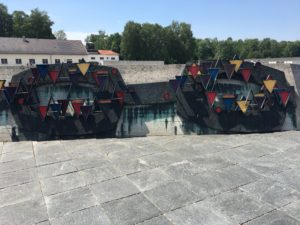Even though I’ve been living with a host family for my stay here in Munich, I haven’t been living with Germans. I’ve been living with a family from Turkey. Even though my host mother was born in Germany, as her parents moved to Germany as part of the Gastarbeiter (Guestworker) initiative, she retains her Turkish citizenship, as does her son. Through my many conversations with her, I’ve gathered new and unique perspectives on Germany and what it is to be German from the perspective of a minority in Deutschland.
The Gastarbeiter initiative in Germany lasted from the 1950s through the 70s. More jobs were available in Germany than there were workers to fill them, so in order to keep the economy growing, Germany sent out an invitation for workers from countries such as Italy, Greece, and most importantly, Turkey. Even though these workers were invited as “guests,” the term “guest” doesn’t exactly fit the situation. Many guest workers, such as my host mother’s parents, started families here in Germany, and for many descendants of guest workers, such as my host brother, German would be their first language even though they often retain Turkish citizenship.
My host mother told me about some of the prejudice and/or racism she has experienced here in Germany because of her skin color. She’s had to deal with comments of surprise at how good her German is, and being told to go back to where she came from, even though she was born here.

After I visited the concentration camp in Dachau, my host brother and host mother especially were eager to talk about it with me, and it was interesting to listen to them grapple with it. Even though they are Turkish, they have roots in Germany now, and the challenge of coming to terms with Germany history awaits everyone with German roots. Even though of course the events are horrifying, I’m not sure I had met anyone who was still actively angry about it until my host mother. For most people I’ve talked about it with, the Holocaust is deeply saddening, but as it is unchangeable history, anger isn’t an emotion that I’ve really encountered. My host mother is especially angry about the “justice” afterwards, and about how many Nazis escaped without any punishment. To many this would be a saddening historical artifact, but it’s still current in her mind, and it affects the way that she looks at elderly German people. She tells my host brother that had he been alive during that time, he would have been killed for being Muslim.

Interestingly, my host mom lived in the United States for six years, and during that time, she says she never experienced any kind of racism, which I found quite surprising. Compared to Germany, her 6 years in Washington, D.C. went by without any racist interactions. For as happy as I am to hear this, I know that there still is plenty of racism in the U.S., and I believe she knows this too, especially with the travel ban laws currently in place and being debated in the United States. On of the first nights I was here, she asked me if they could ban Muslims from entering the United States. She is afraid that they might, and she was hoping to bring her son on a vacation to San Francisco. I wasn’t sure what to say, but I said that I hope that wouldn’t happen and that it ought not to based on my understanding of our constitution.

In my German classes here in Munich, I am the only American in the class. This means I’ve gotten to hear perspectives from China, Tunisia, Hong Kong, Lebanon, Turkey, Columbia, Russia, and Ukraine. It’s not uncommon in class for jokes to be made about Donald Trump. With Trump as the current face of the United States, I feel extra pressure to represent my home country well.
